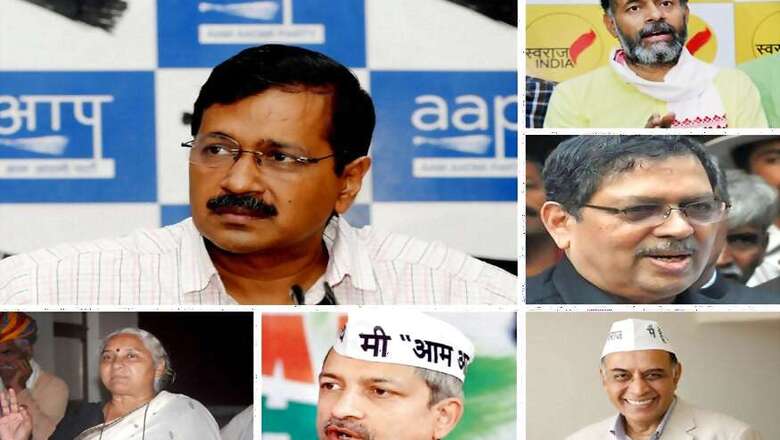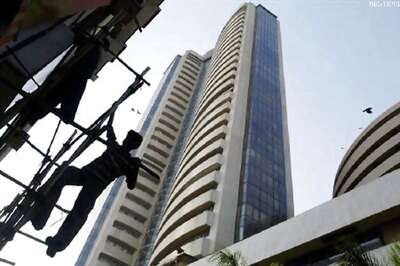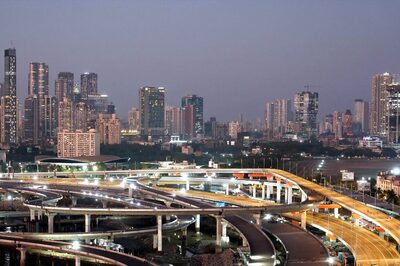
views
New Delhi: After a crushing defeat at his home turf in the Municipal Corporation of Delhi polls, Chief Minister Arvind Kejriwal on Saturday said he will introspect and reinvent the party, which was projected as a beacon of hope for alternative politics at the time of its launch less than five years ago.
“Yes we made mistakes, but we will introspect and course correct. Time to go back to the drawing board,” Kejriwal said after meeting scores of party volunteers and MLAs in the past two days.
News18 asks five pertinent questions related to the future of AAP to five senior leaders — Yogendra Yadav, Justice Santosh Hegde, Mayank Gandhi, Medha Patkar and Anand Kumar — who were earlier with Kejriwal, but either left or got expelled because of their differences with the Delhi Chief Minister. Edited Excerpts:
Q1. AAP was started to do alternative politics, but it seems to be losing that image. What has been the biggest mistake of the party?
Yogendra Yadav: I think it’s the temptation to take a shortcut to political success and enjoy overnight success. This attitude also led to compromise of ethical standards, replacing policy by populism and principles by pragmatism. All this was done for the sake of electoral success. One must realise that if you want to make a mark in alternative politics, then you have to be steady and slow. Even we (Swaraj Abhiyan) learnt it from the results this time.
Santosh Hegde: AAP has lost the confidence of people. Big talks, and no work. The party has violated ethics of politics. People are fed up. They feel there is no difference between them and others. Because of these things, AAP has reached this level.
Mayank Gandhi: I think we did fine till the 2015 Delhi elections. But after we got 67 seats, suddenly Kejriwal and his team started feeling that we have taken over Delhi and now we need to take over India.
Medha Patkar: AAP began to sideline leaders like Prashant Bhushan and Yogendra Yadav, which shouldn’t have happened. The questions that they raised were legitimate and should have been answered by the party. Then, a lot of the candidates who contested on AAP tickets were flawed. The big parties have perfected the art of using money to win power. Somewhere AAP was caught between its principles and the compulsions of today’s electoral politics. People were drawn to anti-corruption movement, but somewhere along the way they lost faith in AAP because it was neither a movement, nor a full-scale party.
Anand Kumar: Voters of Delhi are quite disappointed with AAP, which was the first category of alternative politics. They were accepted for giving better and participatory governance, and on both counts the party has given excuses for the non-delivery of promises. People of Delhi felt cheated because the leadership was interested in expanding their zone of influence, using the resources of the people of Delhi and not meeting their expectations. There was arrogance and no accountability.
Q2. The party and the idea are supposed to be bigger than an individual. But does AAP have a future beyond Arvind Kejriwal?
Yogendra Yadav: There are still hundreds, if not thousands, of honest party workers. For a lot of them, it was their only hope. This belief was an asset to the party, but the biggest liability was the leadership. People like me are responsible who had let the coterie around the top leadership capture the party. AAP is playing the same game like other parties, where the top leadership remains untouched while others take responsibility. For example, Ajay Maken will take responsibility for the Congress loss, but Rahul Gandhi will remain untouched. AAP is cut off from the reality, and hence is isolated from issues.
Santosh Hegde: Party and principles are bigger than individuals. I feel that Kejriwal ignored his own seat in Delhi and was busy chasing a national role. It was a hasty decision. In his eagerness to project himself as an all-India leader, he has ignored local issues. It was his illusion. He is risking his own future.
Mayank Gandhi: First of all, it is a new party and the entire party structure is around Kejriwal. If Kejriwal goes, the rest of the party will just collapse because he hasn’t allowed any strong leader to come up. I believe if Kejriwal goes, the party will also go.
Medha Patkar: The opposition space is shrinking and it is the non-political parties like social movements and NGOs that are increasingly playing the role of the opposition. I cannot say whether AAP has a future beyond Kejriwal.
Anand Kumar: AAP was started as an institute of participatory democracy. It was a result of the quest of the people for such an alternative. Today, political democracy has become a political game consumed by muscle, money and media power. People feel trapped in this elite-oriented system. In this scenario, relevant idea is the much needed change. AAP moved away from the idea of participatory democracy and returned to manipulating the machinery of elections process. Now, it is a party without any difference. After the loss in the MCD polls, they have lost the moral right of running the Delhi government, though they still have the legal basis. Unless they return to the promises of 500 new schools, mohalla Sarkar, Lokpal and better governance, it seems to me the beginning of the end.
Q3. Is there a possibility of all those who either left AAP or were thrown out to come together and take the initiative forward?
Yogendra Yadav: We did it, and that answers it all.
Santosh Hegde: Yes, it is possible. Yogendra Yadav and Prashant Bhushan are already on it.
Mayank Gandhi: It is not about the individuals. It is about a system — transparency, accountability, who reports to whom, and how the entire decision-making process takes place. Somebody will need to take this up. Suppose Kejriwal decides to go to his ex-colleagues to sit together to draw a model with collective leadership. In such a case, he will have to resign from the post of convener of the party and remain only the chief minister of Delhi. When you are in public service, there needs to be humility. You cannot be arrogant.
Medha Patkar: I don’t think it is so easy for the people who were sidelined by the AAP to come together. Swaraj Abhiyan was one such attempt, but they still haven’t been able to establish themselves. It will take time.
Anand Kumar: For people like me, Prashant Bhushan and Yogendra Yadav any idea of going back to AAP is going to be the most ridiculous proposition because it is a house on fire. There is no accountability and no relevance of volunteers. There is a coterie of people at the helm of the party affairs. There are people seen in the media who speak without much link to the reality. Except Arvind Kejriwal and his charisma, there is nothing much. There is no denying that Kejriwal has an element of charisma. He is charismatic to people who observe him from the distance. And we are responsible for that charisma. It happened because in the beginning, we were in a hurry to put up a good challenge to the Congress, the BJP and corrupt corporates. We allowed him to occupy the space created by the exit of Anna Hazare. Now, we rely on the democratic process to dissolve the phenomenon. And it will be dissolved because the dynamics of democracy are very ruthless. Going back to the past, we had leaders who were charismatic like Indira Gandhi and MG Ramachandran. They were big but their charisma dissolved too.
Q4. AAP was born out of the anti-corruption movement. Today, corruption is not a hot enough issue. What should be the new big agenda for AAP?
Yogendra Yadav: I am not their political advisor and it is not my place to comment on this.
Santosh Hegde: Delhi voters are educated. They closely observe everything. The city is facing issues like garbage, health, pollution etc. AAP must focus on them.
Mayank Gandhi: We were fighting against 4 Cs – corruption, communal, criminal and caste. These were the 4 things we were fighting. And that still holds same.
Medha Patkar: The agenda for AAP should be to push for our constitutionally-guaranteed rights like equity and justice. A majority of the people are still denied these rights and the success of AAP should be judged on how well they push for these rights, not in how many seats they win. Fighting against corruption should still be a part of their agenda, and they should keep a watch on the MCD. All parties go through ups and downs in the electoral arena. I don’t think AAPs current electoral misfortunes can be used to judge what the party has done or will do in the future.
Anand Kumar: Corruption is happening in continuity. The Prime Minister has changed from UPA to NDA, but where is the Lokpal? Where is the mechanism of checking corruption in states? Also, now there is major threat of majoritarianism and communalism. It is a greater evil.
Q5: Should Arvind Kejriwal reinvent himself as a leader? If yes, how?
Yogendra Yadav: Advice is only for those who need it. I think they are being advised by the people they deem fit. As I said earlier, I am not their political advisor.
Santosh Hegde: Talking about EVMs after the defeat is not good. Not the right thing to do. Only if the AAP focuses on pro-people development works, the party has a future.
Mayank Gandhi: It is very simple. He has to let go of his ego. He has to apologise to the nation and to so many volunteers. He has to try and create a new team, which is good for the country. He should remove the kind of people he has got around him. And then, for three years, he must forget everything and just run Delhi properly. Do good governance and people will forgive him.
Anand Kumar: There is always a chance to be a better person. Not impossible to change from sinner to saint. Given the present environment, megalomania is worshipped by certain people. For everything going wrong, one can’t blame EVMs or the lieutenant governor. Also, there will always be a lobby against Prime Minister Narendra Modi, but in the eyes of people the relevance of such a lobby is diminishing. Modi as a person is not an issue with the people of India. What they worry about is food, security and governance.
(Written by Debayan Roy, D P Satish, Aritra Hazra, Tushar Dhara, Eram Agha)



















Comments
0 comment